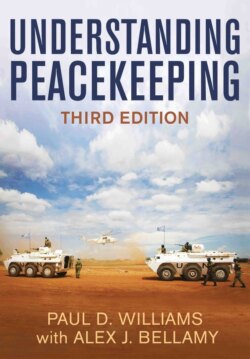Читать книгу Understanding Peacekeeping - Alex J. Bellamy - Страница 25
Cosmopolitanism
ОглавлениеSome advocates of a cosmopolitan approach, perhaps emerging from the ‘global culture’ of the 1990s, insisted that building truly stable international peace and security requires a particular way of understanding, organizing and conducting peace operations. This explicitly normative approach was pioneered by Mary Kaldor (1999), who thought cosmopolitan peace operations were a necessary response to the anti-civilian violence prevalent in what she called ‘new wars’. A second generation of human security was needed, one that was rights-based and employed both top-down and more inclusive bottom-up approaches to peacemaking simultaneously (Chinkin and Kaldor 2017: 479–526). Peace operations have an important role to play in that context and should be reconceptualized as instruments of ‘cosmopolitan law enforcement’ (Kaldor 1999: 124–31; 2006).
According to Kaldor, since ‘the key to resolving new wars is the construction of legitimate political authority’, the solution lay in the ‘enforcement of cosmopolitan norms, i.e. enforcement of international humanitarian and human rights law’, that would enable the protection of civilians and capture of war criminals (2006: x, 132). In this schema, cosmopolitan peace operations involve the creation of a new type of uniformed professional combining soldiering with policing skills. Such operations should address the challenges of ‘new wars’ that stem from their particular exclusivist strain of identity politics, their criminalized mode of warfare, and their globalized systems of finance. Peacekeepers should be prepared to act without the consent of some of the main belligerents – a basic tenet of traditional peacekeeping (see chapter 7) – but seek the consent and support of the victims instead (2006: 135). This, Kaldor recognized, would require peace operations to use force against those that threatened civilians and would therefore involve risking the lives of peacekeepers. Her ideas have been criticized for their simplistic portrayal of contemporary conflicts as involving only innocent civilians and their tormentors (Hirst 2001: 86). Nevertheless, some of Kaldor’s proposals – such as the need for a new conception of impartiality and the centrality of civilian protection – correspond closely with some of the main developments in the practice and policies of peace operations (see chapter 5). In particular, the UN has begun to embrace the need for a more ‘people centred’ approach to its peace operations.
Another variant of this approach, developed by Tom Woodhouse and Oliver Ramsbotham (2005), drew from cosmopolitan political theory, cosmopolitan conceptions of global governance which emphasize inclusivity and accountability, and principles of conflict resolution to argue that peace operations should promote cosmopolitan politics. The vanguard of this effort should be conducted by a standing UN Emergency Peace Service (UNEPS) comprising specially trained military and civilian personnel. UNEPS should be capable of protecting civilians from harm and implementing the full range of the UN’s human security agenda (2005: 153; see also Langille 2014). This is a contemporary variant of the long-standing proposals for a UN standing army dating back to the organization’s origins (see Roberts 2008). However, persuading a critical mass of governments of the merits of the UNEPS idea, let alone operationalizing it, has remained a distinctly uphill battle.
